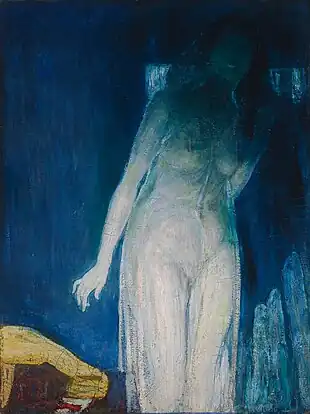| Salomé | |
|---|---|
 | |
| Artist | Henry Ossawa Tanner |
| Year | c. 1903 |
| Medium | oil painting on board |
| Movement | Christian art, Symbolist painting |
| Subject | Salome |
| Dimensions | 116.5 cm cm × 89.4 cm cm (45 7⁄8 in × 35 1⁄4 in) |
| Location | Smithsonian American Art Museum, Washington, D.C. |
| Accession | 1983.95.207A |
Salomé is a painting by Henry Ossawa Tanner, showing the princess Salome from the Bible, who danced before her stepfather Herod Antipas, and who demanded the head of John the Baptist as a reward for her performance. Tanner painted Salome as part of his Christian-themed paintings.[3]
The painting was unusual for Tanner, a "marked departure for the usually reserved artist".[4] Although he did draw nudes as part of his studies, few of his professional paintings feature nudity.[4] This particular painting is even more rare for being perceived as erotic.[4] In this work the eroticism is offset by the bloody head of John the Baptist.[4] Further, Salome is herself decapitated in this painting by shadow.[4]
The work may have been influenced by the works of El Greco.[2] Tanner and his wife Jessie spent several months in Granada in the beginning of 1903, where he had time to study El Greco's paintings.[2] The result on some of his own paintings (including Salome) was his use of the "elongated figure style of El Greco".[2] The painting was admitted into the 1921 Paris Salon.[5] The painting was also displayed in 1924, as part of a solo exhibition put on by Tanner at Grand Central Art Galleries in New York City.[2]
The painting was dontated to the Smithsonian's Museum of African Art by Henry's son Jessy O. Tanner in 1975.[2][1]
Symbolism
Farisa Khalid wrote of another Tanner painting, "Looking closely at the painting, we have to ask ourselves what was the artist thinking in choosing to paint this dramatic scene in blue."[6] Applied to Salome, context indicates that here, in a scene in which Salomé preformed an act of evil and killed a holy man, Tanner's blue may symbolize holy judgement, horror of the consequences of sin, and death.
Tanner imitated art movements, experimenting with his paintings. He would be known as a symbolist, as well as painter of religious art, impressionist and realist or genre painter. In Salomé he used the same colors as The Sin by Franz von Stuck, blue over nudity, face in shadow, red-brown (a head in Salomé) in a corner.
In other works, Tanner users warm colors to indicate holiness, such as Jesus face in Nicodemus and Jesus", Jesus' robes in The Resurrection of Lazarus", and Jesus and the disciples in The Disciples at Emaus. Here the holy colors permeate John the Baptist's head, with separation from the blues of sin and judgement.
References
- 1 2 3 "Salome". Smithsonian American Art Museum.
Henry Ossawa Tanner, Salome, ca. 1900, oil on canvas, 45 7⁄8 x 35 1⁄4 in. (116.5 x 89.4 cm.), Smithsonian American Art Museum, Gift of Jesse O. Tanner, 1983.95.207A
- 1 2 3 4 5 6 Mosby, Dewey F. (1991). Henry Ossawa Tanner. pp. 51, 153, 235.
Henry O. Tanner, Salomé, c. 1902-1903, oil on canvas, 46 X 35 1/4', National Museum of Art, Smithsonian Institution.
- ↑ Mosby, Dewey F. (1991). Henry Ossawa Tanner. p. 182.
...the uniqueness of Tanner's biblical scenes. As in the case of Salomé...and Return of the Holy Women...he used scriptural texts as a point of departure, but he did not merely illustrate them in the stylized manner of other contemporary painters.
- 1 2 3 4 5 "Henry Ossawa Tanner". theartstory.org.
- ↑ "Random Impression in Current Exhibitions". New-York Tribune. New York, New York. 7 August 1921. p. 41.
Other American works to be admitted to the salon were: "Salome" by Henry O. Tanner...
- ↑ Khalid, Farisa. "Henry Ossawa Tanner, Angels Appearing before the Shepherds".